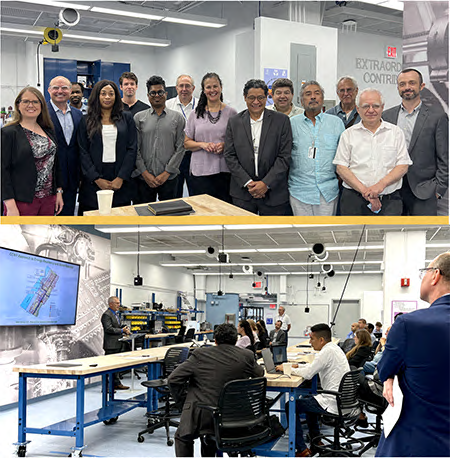
CCNY site visit by U.S. Department of Energy delegation. Top group photo: Kelly Speakes-Backman (8th from left), Jorge E. Gonzalez (9th) and Alexander Couzis, dean of The Grove School of Engineering at CCNY (10th).
In response to the pressing need for decarbonization in the building sector, The City College of New York has begun a joint effort with the United States Department of Energy’s (DOE) Building Technology Office (BTO) and the City of New York Office of Climate and Sustainability for the development of advanced heat pump systems (HP). The project was facilitated by the Minority Serving Research & Development Consortium (MSRDC).
Buildings represent a large source of energy consumption and greenhouse gas (GHG) emissions and are a major space for decarbonization. The main goal of this initiative is to develop commercially feasible HP systems for the multi-family buildings in cold climates. In December 2021, New York City passed a bill to decarbonize the building sector by 2050. The fossil fuels used in space heating and cooling account for 60% of GHG emissions from buildings and 30% of citywide GHG emissions.
“This effort is in support of decarbonization of the building sector, particularly for electrified systems for the winter seasons. Both New York City and New York State have pledged to decarbonize the building sector in the next 10 to 20 years as a strategy to reduce carbon emissions,” said Jorge Gonzalez-Cruz, CCNY presidential professor (on leave), founding editor of ASME J. of Engineering of Sustainable Buildings and Cities, and professor of empire innovation at the Atmospheric Sciences Research Center, University at Albany, SUNY. “It will allow for electrical based space cooling, heating, and hot water with minimal impact in the environment.”
Previously, heat pump systems were better been optimized for moderate climates, where there is a greater need for cooling than heating. In colder climates like the Northeast, it has traditionally been difficult to build an efficient system that is both affordable and attractive to customers with HP systems powered by gas or oil.
“Through energy efficiency measures, we have tremendous potential to increase building performance and reduce costs without compromising the comfort of historic integrity of many of the buildings found here in New York City,” said Kelly Speakes-Backman, principal deputy assistant secretary for Energy Efficiency and Renewable Energy. “One of the most proven methods for achieving these optimal savings is by implementing building energy codes and standards. I’m excited to share in this vision with the City College of New York and local partners to improve the affordability, reliability, and resilience of these impressive buildings.”
On July 21, multiple stakeholders in the effort, including Speakes-Backman visited CCNY to showcase their commitment to expand collaborations with minority serving institutions in their research portfolio and in support of decarbonization strategies. The Mayor’s Office of Climate and Sustainability and the New York State Energy and Research Development Authority (NYSERDA) will also join the conversation of decarbonization efforts and related technologies.
About the City College of New York
Since 1847, The City College of New York has provided a high-quality and affordable education to generations of New Yorkers in a wide variety of disciplines. CCNY embraces its position at the forefront of social change. It is ranked #1 by the Harvard-based Opportunity Insights out of 369 selective public colleges in the United States on the overall mobility index. This measure reflects both access and outcomes, representing the likelihood that a student at CCNY can move up two or more income quintiles. In addition, the Center for World University Rankings places CCNY in the top 1.8% of universities worldwide in terms of academic excellence. Labor analytics firm Emsi puts at $1.9 billion CCNY’s annual economic impact on the regional economy (5 boroughs and 5 adjacent counties) and quantifies the “for dollar” return on investment to students, taxpayers and society. At City College, more than 16,000 students pursue undergraduate and graduate degrees in eight schools and divisions, driven by significant funded research, creativity and scholarship. CCNY is as diverse, dynamic and visionary as New York City itself. View CCNY Media Kit.
Laura Baisas/Ashley Arocho
p: 212.650.6460
e:
aarocho@ccny.cuny.edu